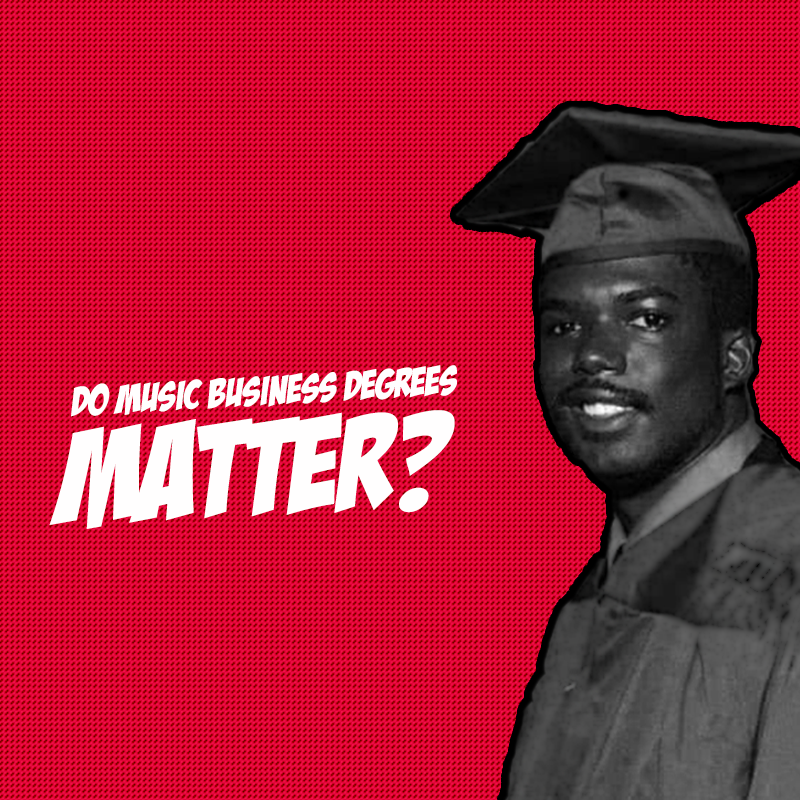Perspective of an academic– Pros and cons of a music business degree
Over the past decade and a half, there has been an acceleration of music business degrees in schools and universities. However, many prospective students wonder if they are a necessity.
Music and the music business are two different things.
Eryka Badu
As I write this article–I’m a semester removed from obtaining an MBA. I have a bachelor’s in Marketing from a four-year university and I studied music production at SAE Institute.
With a decade worth of experience in the music industry I this article to share perspective. There are many pros and cons to why you should or shouldn’t get a music business degree. Whatever reasons one could come up with here are my main two:
–A PRO of a Degree: Harnessing Relationships
Music business degrees are a great way to learn the fundamentals of the music business. You get to learn the basic ideas of music publishing, management, and marketing.
Your professors might be retired or may currently work in the industry. You’ll have the opportunity to pick the minds of people who have been in it.
Ivan “Ill Factor” Corriliza was someone I learned from while I attended SAE Institue.
He’s a Grammy-nominated songwriter-producer boasting credits Kelly Rowland, Justin Timberlake, and Assains Creed (video game series) to name the few.

He taught the music game and valuable information that has helped me in many ways.
Nevertheless, a great thing you get to do is network and possibly meet life long friends. Some of your peers will probably go on to do amazing things in the music industry.
For example, a few of my peers I met a some years ago became platinum-selling record producers, well-known managers, music entrepreneurs, etc.
The environment itself and the relationships you build will be a benefit. Somebody that you may not speak with much in class might be a person you end up doing business with years from now.
–A CON of a Degree: Outdated Curricula
With the fast-changing world of music today, unfortunately, circulars are often outdated.
For example, by the time I graduated with my bachelor’s in 2012 the marketplace had rapidly changed.
Traditional marketing had been relevant in business for decades was being disrupted by the onslaught of information technology.
Social media was beginning to become a force and produced better ROI at scale than most mass media advertising.
Digital sales shifted to where streaming was the mainstay in music consumption. The market became more efficient in meeting the needs of the music fan.
Competition became greater because the barrier of entry was diminished. Anybody who had a camera, computer, and a $200 monthly budget could build a sizable fan base for their brand.
Indie musicians weren’t just competing in the indie space but also with real estate of major artists. Technology allowed anybody who had the skill to broadcast quality content and distribute the same way as a record label.
Content marketing was ever so more important not just in music but for every industry. But strangely, I never learned a thing about it while I was in college. This was what was relevant and the school failed me in this perspective.
What Are My Overall Thoughts on Music Business Degrees?
Unless you’re working toward becoming an entertainment lawyer, an accountant, or one of those few occupations that require a degree, most of what you learn and your success will come from is by working in the field.
I’ve worked alongside many people in music and met with thousands of people across the United States and Central America.
No one has never asked me qualifications in terms of what degree I have. I get judged on what I’ve produced, my ideas and skills.
A degree won’t prepare you in handling personalities when project managing, or building relationships.
The music industry is more than theories and concepts. A degree, in general, can provide structure for you to succeed but it’s not necessary. If you decide to pursue a program that offers one have fun and take up as much information you can.
Network and find guidance among your faculty and peers who may have experience in the business.
Don’t be lazy, you should always look to create opportunities and network outside your program. Retrospectively, you could end up with a degree and not knowing how to work in the real world.
Start as soon as possible to be proactive. Volunteer, apply for jobs or internships.
Go conquer the world.

